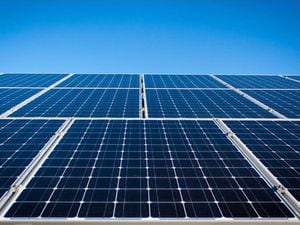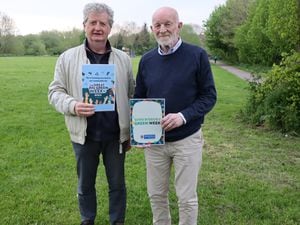Shropshire councillors refuse plans for new solar farm south of Shrewsbury
Plans put forward for a 30-megawatt solar farm near Shrewsbury have been thrown out by councillors.

Councillors on Shropshire Council's southern planning committee went against the advice of officers and refused permission for the proposed solar farm on land to the west of Berrington at their meeting today.
Planning officers cited "significant" ecological concerns, as well as the loss of designated Best and Most Versatile land (BMV, a grading system for the efficiency and productivity of agricultural land); the visual impact; the lack of consultation with the local community; and mitigation for the loss of arable land not being sufficient enough, as their reasons for refusing the application.
The application for the solar farm, by Econergy International Ltd, would have had the potential to "offset the average annual UK electricity consumption of approximately 7,000 houses per annum".
The development would have had a lifespan of up to 40 years, after which it would be decommissioned and reverted to agricultural use, with all associated equipment removed.
On the Shropshire Council planning portal, there were 194 comments in support of the proposal and 107 objections.
At the meeting, a statement was read out on behalf of Berrington Parish Council, who objected to the proposal.
It read: "The parish council recognises the importance of solar power and like many here today, supported the two other schemes in the very near vicinity of this proposal.
"The Berriewood Installation attracted no objections and Condover Installation attracted only three objections. This application attracted 107 objections from the settlement of Berrington and Cantlop.
"At the meeting in November 2022 the parish council unanimously objected this application due to the key ecological, nature conservation concerns, inappropriate use of high grade agricultural land, limitations on the consultation process, traffic concerns and the visual impact.
"The November meeting was attended by over 60 residents from the impacted communities of Berrington and Cantlop with three residents from Cross Houses.
"The applicants have never attended a parish council meeting and as far as I'm aware there have been no offers of discussion of meaningful mitigation or community benefit.
"There is a real sense of disappointment and frustration that the applicants have not found it necessary to attend the parish council meetings.
"The applicants sent letters to 45 impacted residents prior to the submission of the application and organised a public meeting.
"At the meeting the applicant promised a wide range of mitigation and agreed to share all their reports with the impacted communities prior to the submission of the application.
"Unfortunately this never happened and the promises made never materialised."
Econergy International Ltd had offered an Arable Mitigation Fund of around £7,000 to be given out to local farmers every five years to make up for the loss of land.
The applicant also stated in their proposal that "the temporary loss of arable productivity within the solar site will be mitigated by reversion of current Higher Level Stewardship land elsewhere within the farm unit to productive arable use."
However, there was a general consensus among councillors that the BMV land was too valuable for its agricultural use and that the proposals for mitigation by Econergy were not sufficient enough for the loss of that land.
Councillors referred to the fact that 34.9 hectares – or 88.2 per cent – of the land is BMV land. The majority is Grade II, the rest Grade 3a.
Councillor Andy Boddington said: "In national guidance there is a clear presumption against using BMV land and that applies across planning policies including solar farms.
"I'm concerned that losing BMV land would lead to issues with food resilience and with more and more solar farms, if they're built on BMV that could affect our national resilience which is already weak.
Councillor Ed Potter added: "Listening to the debate and the discussions around the mitigation it seems there's an awful of of 'ifs' 'buts' and 'maybes' – there are no real guarantees.
"We don't know what the succession will clearly be to the higher level stewardship scheme; the mention of the money offered I don't believe will be an incentive enough to return land, which has probably now got a high ecological value – because it's been in the stewardship scheme – to arable use.
"Effectively you'll destroy one highly ecological area in effect to turn it back into arable land at the expense of putting the solar farm on already highly productive land which is best and most versatile.
"Forty years is a long time, it seems almost that this is a short-term fix to a long term problem. I'm not convinced by this application at all and I think there are plenty of material planning considerations for us to recommend refusal of this."
Ten members of the committee voted in favour of refusal, while one abstained.





